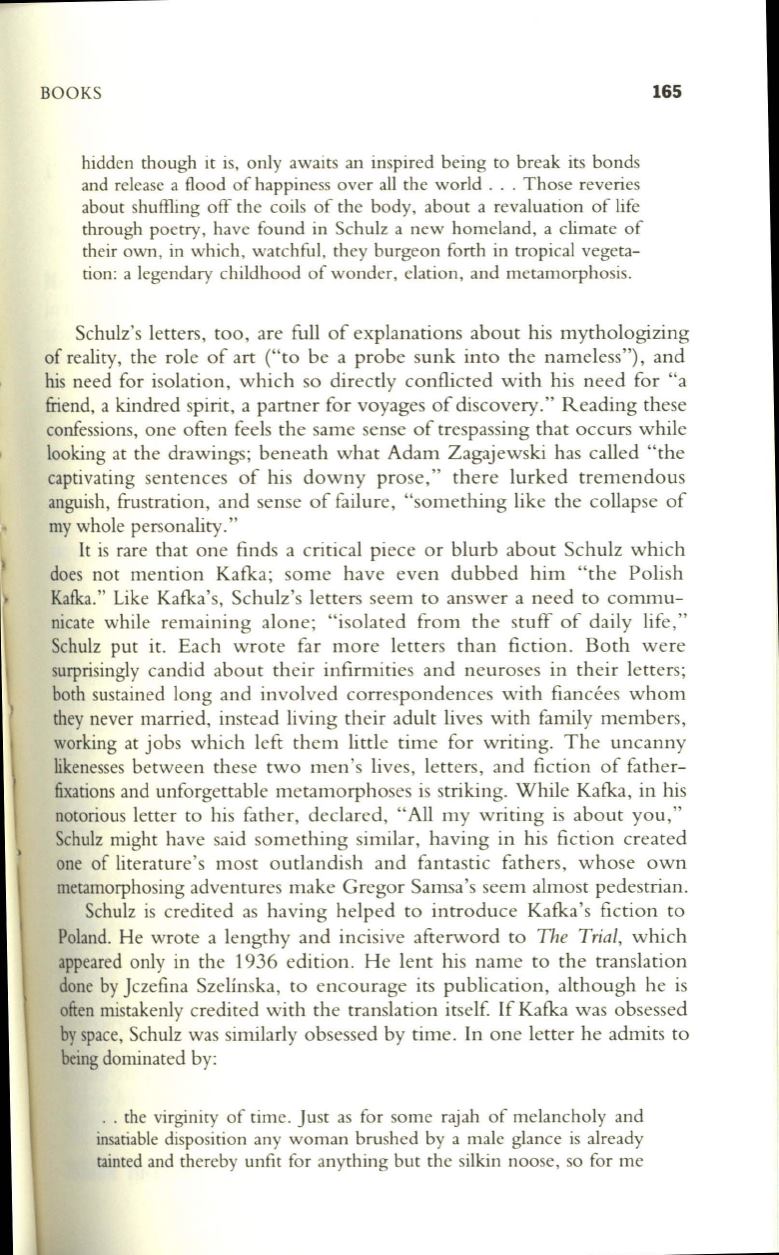
BOOKS
hidden though it is, only awaits an inspired being to break its bonds
and release a flood of happiness over all the world ... Those reveries
about shuffiing off the coils of the body, about a revaluation of life
through poetry, have found in Schulz a new homeland, a climate of
their own, in which , watchful, they burgeon forth in tropical vegeta–
tion: a legendary childhood of wonder, elation, and metamorphosis.
165
Schulz's letters, too, are full of explanations about his mythologizing
of reality, the role of art ("to be a probe sunk into the nameless"), and
his need for isolation, which so directly conflicted with his need for "a
friend, a kindred spirit, a partner for voyages of discovery." Reading these
confessions, one often feels the same sense of trespassing that occurs while
looking at the drawings; beneath what Adam Zagajewski has called "the
captivating sentences of his downy prose," there lurked tremendous
anguish, frustration, and sense of failure, "something like the collapse of
my whole personality."
It is rare that one finds a critical piece or blurb about Schulz which
does not mention Kafka; some have even dubbed him "the Polish
Kafka." Like Kafka's, Schulz's letters seem to answer a need to commu–
nicate while remaining alone; "isolated from the stuff of daily life,"
Schulz put it. Each wrote far more letters than fiction. Both were
surprisingly candid about their infirmities and neuroses in their letters;
both sustained long and involved correspondences with fiancees whom
they never married, instead living their adult lives with family members,
working at jobs which left them little time for writing. The uncanny
likenesses between these two men's lives, letters, and fiction of father–
fixations and unforgettable metamorphoses is striking. While Kafka, in his
notorious letter to his father, declared, "All my writing is about you,"
Schulz might have said something similar, having in his fiction created
one of literature's most outlandish and fantastic fathers, whose own
metamorphosing adventures make Gregor Samsa's seem almost pedestrian.
Schulz is credited as having helped to introduce Kafka's fiction to
Poland. He wrote a lengthy and incisive afterword to
The Trial,
which
appeared only in the 1936 edition. He lent his name to the translation
done by Jczefina Szelinska, to encourage its publication, although he is
often mistakenly credited with the translation itself. If Kafka was obsessed
by space, Schulz was similarly obsessed by time. In one letter he admits to
being dominated by:
.. the virginity of time. Just as for some rajah of melancholy and
insatiable disposition any woman brushed by a male glance is already
tainted and thereby unfit for anything but the silkin noose, so for me


